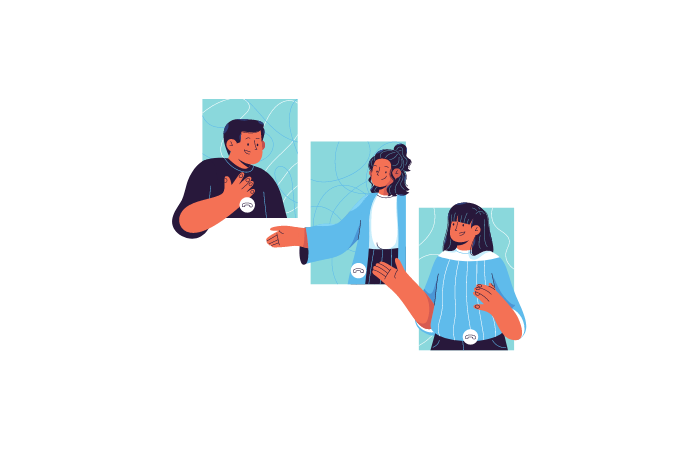
Exploring Inclusive Innovation Through our Bilingual BBLs
In the fall of 2020, Impact Hub Ottawa hosted a three-part Bilingual Brown Bag Lunch (BBL) series funded by the Association des communautés francophones d’Ottawa (l’ACFO) and in partnership with the L’Atelier d’innovation sociale Mauril-Bélanger and MécènESS.
The Bilingual BBLs were an extension of our weekly lunch and learn series, but this time, they were hosted in French and English with simultaneous translation to create a linguistically inclusive experience. The three events, presented by eight speakers, focused on inclusive innovation and were attended by over 100 participants.
Finding Space for Collaboration
Language shouldn’t be a barrier to collaboration, but that is often the case. Impact Hub Ottawa has long fostered strong relationships with local francophone innovation organizations, working to support and promote one another. This shared desire to collaborate led to the design of a French-English exchange event, building a bridge between our audiences to create an open environment for the sharing of ideas from participants of different linguistic backgrounds.
ACFO’s ‘Bilingual Ottawa’ grant offered the perfect opportunity to formalize these longstanding partnerships, and to fund the work of designing and delivering a series that connected our like-minded, if linguistically distinct, communities. Creating space for partnerships and collaboration is often the best way to exchange knowledge, and while collaborative projects often present their own sets of challenges, especially when adding a second language, we were excited to have the opportunity to bring people together to host a conversation across this barrier.
Uncovering Inclusive Innovation Through Bilingual Knowledge Exchange
The theme of Inclusive Innovation shaped the three events, which emphasized learning from a diversity of perspectives while promoting language accessibility as a core part of inclusion. The topic also fell in line with the missions of Impact Hub Ottawa, L’Atelier and MécènESS, three organizations whose work is dedicated to enabling inclusive entrepreneurship and innovation.
All speakers for these events were French-speaking (though some chose to speak in both French and English) and selected by our francophone partners. To make the experience more accessible, the Bilingual BBLs were accompanied by typed simultaneous live translation – a first for an Impact Hub Ottawa event! The discussions themselves were vibrant with ample opportunities for the audience to share their perspectives in both French and English during the Q&As.
The first of the three Bilingual BBLs explored the social economy with speakers Michael Toye of The Canadian Community Economic Development Network (CCEDNET), Ethel Côté of MécènESS, Yvon Poirier of The Intercontinental Network for the Promotion of Social Solidarity Economy (RIPESS) and Julien Geremie of Conseil de la Coopération de l’Ontario (CCO). The social economy refers to the economy on a human scale, which aims to be inclusive and put people at the heart of development. It exists at the intersection between organizations, cooperatives and social enterprises. Yet, the concept of the social economy is difficult to translate from English to French, and the term “common economy”, which unites the theme of economy with social movements, is often presented as an alternative.
The second Bilingual BBL built on the public aspect of the social economy, where speakers Amal Azouz of Global Affairs Canada and Ericka Alnus of Pour 3 Points shared key suggestions and resources for how organizations, movements and individuals can get elected officials to support their projects. They highlighted the benefits of strong relationships with your riding’s public officials as well as tips for how and when to get in contact with them to facilitate collaboration, like getting them to make appearances at your events and following up so that they take meaningful political action to support your cause.
The third Bilingual BBL explored the the “what” and “how” of activism with Rosalie Thibault, the co-founder of La Coalition Étudiante pour un Virage Environnemental et Social (Ceves) and Allie Rougeot, the co-founder of Friday’s for Future Toronto, both young climate activists working in francophone and anglophone communities. They recounted their experience in creating education campaigns that mobilize social action around shared concerns. To be an activist is to participate, however you can, in the public debate It is building links with people who you might have never met, through shared values and convictions to rebuild a sense of community and fight individualism.
Looking forward: Embracing Multilingualism
The series provided us with an invaluable opportunity to explore alternative ways of making our events more accessible to new audiences, but it also served as an important learning experience. Hosting the Bilingual BBLs reminded us that inclusivity is not an end goal, but rather a constant process of improving services to be more accessible and representative of the diverse voices within and beyond our community. While we were able to reach new Francophone audiences, a focus on only bilingualism obscured Canada’s rich history of multilingualism and the more than 50 Indigenous languages that are still spoken on this land.
At our events and in the stories we tell about our work (including on this blog!), we are never telling the full picture. Only by acknowledging that limitation and continuing to uncover and challenge our biases can we be sure we’re on the path to making our members – and anyone who might join – feel welcomed in our space and at our events. This series of events may have been our first attempt at virtual, bilingual-friendly events , but it won’t be our last. We look forward to going beyond bilingualism and challenge the narrative that this is a land of two languages, two cultures, and two peoples. It is so much more, and it’s time we put that at the centre of our work.
On March 4th and 18th, Impact Hub Ottawa will be hosting two Cross Border Conversations exploring how to (re)centre Indigenous knowledge and anti-racism in climate action and at work.
- Come and join the discussion, sign-up on Eventbrite.